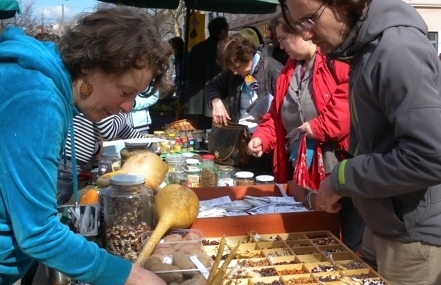06/13/2013, 16:49
JOINT STATEMENT ON THE PROPOSAL ON LEGISLATION ABOUT PLANT REPRODUCTIVE MATERIAL
www.seed-sovereignty.org/PDF/joint_statement_seed_legislation_2013-06-12_web.pdf
On the 13th of June, the EU Commission will hold a conference in Brussels with the EU Parliament and EU Council to explain the package “smarter rules for safer food“ on seed marketing, plant pests, animal health and related official controls.
Whilst in the preamble, the proposal for the plant reproductive material law looks as if every effort is being made to preserve and promote agricultural biodiversity and on-farm conservation, the reality is that the opposite is happening. New rules and restrictions have been created which hamper the freedom of farmers and seed saving organisations. In addition, the “niche” (art. 36) is not going to work in a practical sense, because of the restrictions assigned to “niche” sector and the perspective of them being further tightened by means of “Delegated Acts” by the EU Commission at any stage.
The main lobby organization of the seed industry ESA has in a letter to MEPs expressed their satisfaction with the proposal in an alarming way (www.seed-sovereignty.org/PDF/ESA_to_EU_Parliament.pdf).
ESA writes “The proposals of the European Commission … pave the way for establishing a modern, dynamic, harmonised and simplified legal framework for seed.”
What does this sentence of ESA mean?
1.) In this context, ”modern” means: The law is made for the demands of the seed industry; more precisely to facilitate the commercialization of varieties dependent on fertilizers, pesticides and other chemicals in order to increase agricultural productivity. This deprives European citizens of the choice for another agricultural model which does not affect the water tables and the soil. Some “modern” biotechnological breeding methods, which are not classified as “classic” genetic manipulation and do not require special labelling, result in infertile plants. This is a danger for agro-biodiversity.
We demand transparency in breeding methods! European citizens must have a choice of which agricultural development they want to support. Therefore proprietary and non-reproducible varieties must be labelled as such.
2.) “Dynamic” probably refers to the many Delegated Acts, more than 30. With these Delegated Acts, the Commission reserves the right to formulate the details of the legislation at a later date by committee vote without approval of the Parliament. Not only technical details, but many important issues are left open. The proposal is only a “legal framework” that is later defined by committees heavily influenced by industry.
We demand that the EU Parliament should not adopt such a black box.
3.) “Harmonised” refers to the fact that this law will be valid without national adaptation in all EU states. This is for the benefit of transnational corporations of the seed and agrochemical industries; they want to sell to a common market.
We demand that the EU member states have room to adapt the law to local needs of agriculture and horticulture.
4.) The ESA welcomes the alleged “farmers’ access to the best plant varieties”.
We strongly question the idea that the varieties of the seed industry are the best. They are the ones adapted to agrochemicals and to industrial agriculture and industrial processing of food. These are not adapted to local soil and climate, not adapted to small scale agriculture nor to the tastes of people in the different member states.
5.) The ESA does not tell us the true costs of their industrial seed production: the farmers' loss of independence, their ability to produce seeds and other propagating material themselves, the loss of soil fertility and the loss of the fauna and flora in the forests and fields due to the use of agrochemicals.
We demand that farmers and gardeners should be able and allowed to produce and exchange their own seeds and propagating material, without niche limitations and without mandatory registration of operators, without any mandatory registration of plant varieties and without any mandatory certification or registration of seed lots! Especially seeds not covered with Intellectual Property Rights should be exempt from mandatory registration.
In summary, you do not need such a restrictive and bureaucratic legislation to produce seed of high quality, even the seed industry does not need that, do they? The fact that ESA demands restricted market access, only for their own category of varieties, shows how insecure they are with regard to market success of such seeds. It seems that ESA is afraid of free competition with farmers' varieties, with varieties bred for organic farming, and with diversity varieties – even though these varieties comprise only a small part of the seed market. ESA demands a bureaucratic legislation, because the administrative burdens can only be covered by multinationals with huge seed sales volumes or, simply, enough


